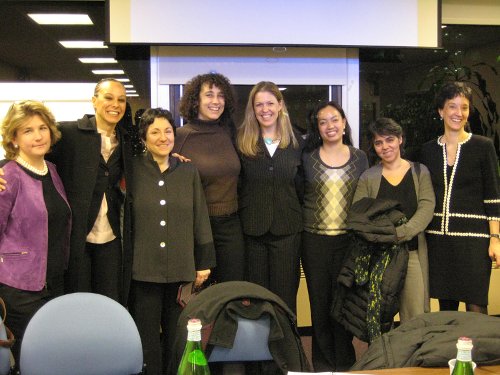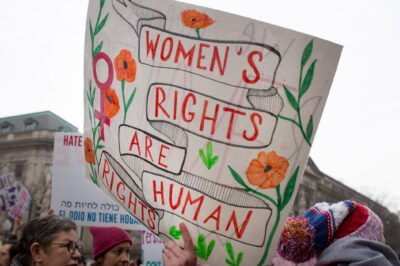Seizing the Moment to Engage the Obama Administration in Real Change for Women and Girls
Tomorrow will mark International Women’s Day, providing an opportunity both to celebrate women and the strides we’ve made towards equality, and to recommit ourselves to the ongoing struggles for women’s rights.
On Thursday night, in conjunction with the 53rd Session of the United Nations Commission on the Status of Women, the ACLU and partner organizations hosted a dynamic roundtable discussion with human rights advocates about their visions for engaging with the Obama administration to advance women’s rights.

From left to right: Betsy Hawkings, Amnesty International; Malika Saada Saar, Rebecca Project for Human Rights; Lenora Lapidus, ACLU Women’s Rights Project; Andrea Ritchie, Sex Workers Project of the Urban Justice Center; Sarah Paoletti, University of Pennsylvania Law School Transnational Legal Clinic; Ivy Suriyopas, Asian American Legal Defense and Education Fund; Cathy Albisa, National Economic and Social Rights Initiative and Louise Melling, ACLU Reproductive Freedom Project.
Speakers (PDF) offered messages of excitement, opportunity, and hope — recognizing the women’s rights victories that have been won in just the last six weeks (Ledbetter, the repeal of the Global Gag Rule) — but also cautioned against the temptation to “sit back on our laurels,” and stressed the importance of pushing the administration and Congress to make real change for the women and girls at the margins of society.
Professor Yakin Ertürk, the U.N. Special Rapporteur on Violence Against Women, started the evening off by sharing her thoughts about the global significance of Obama’s election and her support of domestic human rights advocates’ work to combat violence against women in the U.S.
Malika Saada Saar of the Rebecca Project for Human Rights talked about the “cradle-to-prison-pipeline” that funnels children of color into the juvenile and criminal justice systems, and called for recognition of the “sexual abuse to prison pipeline,” which incarcerates children who have suffered abuse — disproportionately girls — rather than treating them. Cathy Albisa of the National Economic & Social Rights Initiative highlighted the need, not only for policies that directly address women’s rights, but also for a discussion of how women are impacted in the crafting of all government policies. She pointed out the glaring absence of a gender perspective in the national conversation about economic recovery and health care reform, and urged the critical importance of arming American women with the tools necessary to empower their families and communities, a strategy that advocates use with great success in other countries.
Several of the advocates identified the need to not only reach for the low-hanging fruit but also to think strategically about what our larger goals for the next four to eight years will be. They called for human rights activists to unite and fight side by side for their causes, to recognize that workers’ rights are women’s rights are immigrants’ rights are LGBT rights are human rights.
One of the solutions proposed was international human rights treaty ratification as the basis for continuing the struggle for women’s rights and reigniting a critical conversation about the “forgotten and/or disparaged rights that are so central to women’s lives.” In fact, it is critical to note that all of the major human rights treaties that have not been ratified by the U.S. are of particular importance to women and girls: the Convention on the Elimination of All Forms of Discrimination against Women (CEDAW), the Convention on the Rights of the Child (CRC), and the International Covenant on Economic, Social and Cultural Rights (ICESCR).
In the last six weeks, we’ve already seen an administration that is more receptive to hearing our visions for a better future for women, affirming that this is the right moment to recommit as a nation to advancing women’s human rights.
Stay tuned for more follow-up on Thursday night’s event and visit the ACLU’s website to learn more about the work of the Women’s Rights Project and the Human Rights Program.
— Selene Kaye & Nahal Zamani





